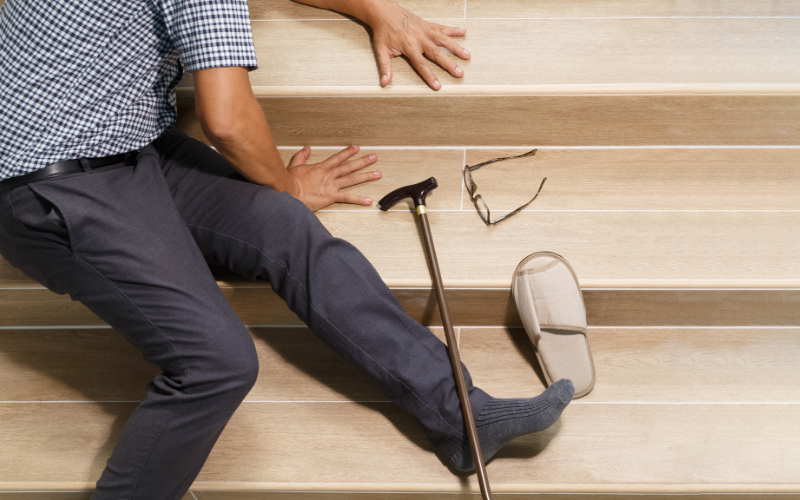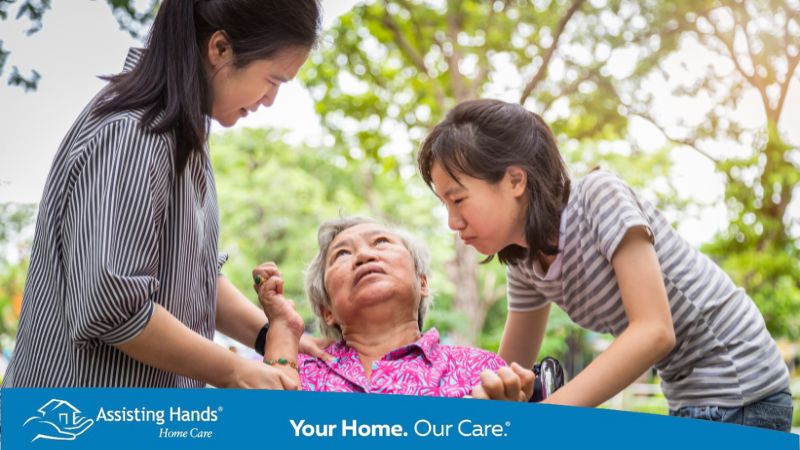
Fracturing a hip is a serious event, and can sometimes be life-threatening. Older people are more prone to hip fractures due to advancing age. Several different factors, such as the ones that follow, increase the risk of hip fractures in the elderly.
Factor 1: Falls
Falls are the most common causes of hip fractures in the aging population. Several factors contribute to falls in the elderly, including poor balance, vision impairment, and taking multiple medications. Falls can occur anywhere, such as outside or inside the home environment.
Stumbling over objects in a cluttered bedroom, for instance, can result in a fall and a possible hip fracture. Similarly, the wet floors in the bathroom can lead to a fall, especially when the aging person is not supported by grab bars or other types of safety products.
The Centers for Disease Control reports that 300,000 seniors are hospitalized each year for hip fractures, with 95 percent of them being caused by falling, usually sideways. Older women, experiencing three-quarters of all hip fractures, fall more often than men.
Factor 2: Osteoporosis
Elderly individuals’ bones weaken with advancing age, a condition known as osteoporosis. A senior who suffers from osteoporosis has bones that are more likely to break. The condition causes the bones to become so brittle that even minor stresses can lead to breakage.
Fractures can appear when a senior with osteoporosis bends over, coughs, or falls. Osteoporosis-related fractures commonly occur in the hip, as well as in the wrist and spine. A senior with osteoporosis may lose height over time, have a stooped posture, and have bone that breaks more easily than expected.
Bone, a living tissue, is constantly broken down and replaced. In seniors with osteoporosis, however, the creation of new bones does not keep up with the loss of the old bone. The condition affects men and women, with women past menopause having the highest risk.
Factor 3: Balance Problems
Certain medical conditions, like Parkinson’s disease, contribute to an increased risk for falls and hip fractures. Symptoms of Parkinson’s, such as rigidity, slowness of movement, and changes to posture, increase the risk of falling and suffering injury, such as a hip fracture.
Seniors with Parkinson’s can experience a loss of balance while engaging in daily activities, like standing up, bending forward or down, turning sharply, walking while turning the head, or talking. Some people with the condition have double or blurry vision, which can lead to falls and fractures.
Problems with balance and subsequent falls and hip fractures can also occur in aging adults who suffer from low blood sugar or low blood pressure. Hypotension (low blood pressure) potentially causes dizziness and fainting, leading to falls and fall-related injuries.
Factor 4: Certain Medications
The long-term use of some medications can weaken bones. Cortisone medications, such as prednisone, are an example. A senior who takes certain medications or a combination of multiple drugs is susceptible to dizziness, which is a precursor to falls and possible hip fractures.
An increased risk of falls is linked with taking sedatives, hypnotics, antidepressants, and benzodiazepines. Antidepressants have the strongest association with falls. Additional drugs that can increase the risk of falls in the elderly include neuroleptics, antipsychotics, and nonsteroidal anti-inflammatory medications.
Factor 5: Nutritional Deficiencies
Seniors who consume inadequate amounts of calcium and vitamin D in their younger years are more likely to develop lowered peak bone mass, which increases their risk of fractures later in life. Older people, nevertheless, should get enough calcium and vitamin D to maintain bone density.
Aging adults who receive the recommended daily calcium amount through a healthy diet, supplements or a combination of both, maintain bone strength. Food sources that contain calcium include yogurt, winter squash, canned sardines, salmon with bones, almonds, and calcium-fortified orange juice.
Factor 6: Lack of Exercise
Weight-bearing exercises, such as walking, strengthen bones and muscles. However, when a senior does not engage in physical activity on a regular basis, he will have weakened bones and muscles, which make falls and hip fractures more likely. Exercise can reduce the risk of brittle bones.
Seniors can prevent hip fractures by engaging in weight-bearing physical activities on a regular basis. In addition to walking, examples of such exercises include hiking and jogging. Aging adults who participate in a Tai Chi program also help to maintain their strength and balance.
A hip fracture can reduce a senior’s independence or even shorten his lifespan. Approximately half the people who experience a hip fracture are unable to regain their ability to live independently. Complications of a hip fracture include further loss of muscle mass, bedsores, and blood clots.

Preventing a fall and hip fracture remains a priority at Assisting Hands Home Care. Our professional caregivers are trained to identify fall risks and work to prevent them. We engage in routine inspections of the home to eliminate fall hazards and keep our care recipients safe.
Our home care professionals remove throw rugs, which can lead to a slip and fall, as well as keep electrical cords against the wall. Excess furniture is removed or repositioned to prevent stumbles. We also ensure all hallways and rooms are well lit.
We encourage our senior care recipients to exercise. Caregivers offer physical support, if necessary, during walks or provide transportation to senior exercise classes, like Tai Chi. A senior who still does not feel steady can utilize a walker, cane, or walking stick.
The fall prevention services from Assisting Hands Home Care are one component of our comprehensive home care services. We also support seniors with the activities of daily living. Call us at (224) 268-9068 to learn more about our in-home senior care services in Buffalo Grove, Grayslake, Green Oaks, Hawthorn Woods, Deerfield, IL | Lake Zurich, IL | Lake Forest, IL | Lincolnshire, IL | Mundelein, IL| Vernon Hills, IL | Highland Park, IL | Libertyville, IL | Round Lake Beach, IL and the surrounding areas.















